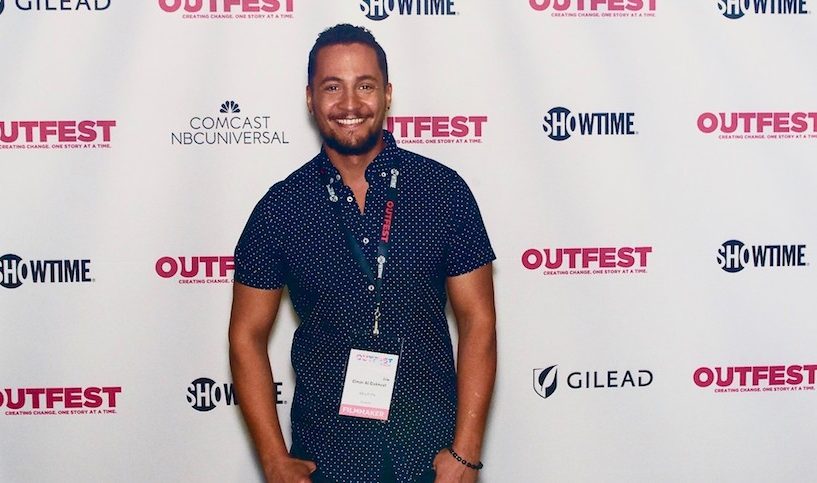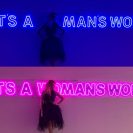Omar Al-Dakheel ‘s Al Imam, currently making its rounds at festival circuits, focuses on one of the world’s few female imams: Ani Osman-Zonneveld, the founder of Muslims for Progressive Values.
Though it has not yet been released online publicly as yet, it was produced in 2016. It is the second of three short films by Al-Dakheel. His first documentary – Jihad in Hollywood – came out in early 2016 and won the Grand Prize at Kuwait Film Festival last year. And, his latest narrative film Ablution (Oct 2017) premiered at the Austin Film Festival. Here, Omar Al-Dakheel answers questions about Al Imam for this month’s issue of bazaar.
Is it accurate to say that a film is a reflection of the director’s consciousness?
That could be true. For me, I think a film is a reflection of the director’s curiosity, especially with my past background as a journalist.
Ani Zonneveld has faced backlash by certain male scholars. While Al Imam was objective, it must have been refreshing for her to be interviewed by a male who hails from a Muslim country. Tell us about one of your pleasant interactions behind the scenes.
That’s very true. And, it’s not because I’m from a Muslim country but also from an Arab country. Ani refused to have documentaries made about her when she was reached out by other people, but when we met she saw that I wasn’t coming from a place of judgment, and I think that gave her comfort to discuss her private life and open her home for me to make this film.
Ani propagates progressive Islamic values. However, from her arguments, it can be deduced that she is actually inviting Muslims to return to the original essence of Islam. You navigated this paradox smoothly. Was this intentional?
It might look smooth on film. But it was a very complicated topic with a lot of discussions and questions throughout the making of the film. But, we finally managed to cut it smoothly to show the beef of what Ani is trying to say. Her argument is that she’s not inventing a new Islam; she’s basically advocating the progressive essence of it. So, just like Muslims in the 7th century used their God-given brains to solve their issues, we in the 21st century need to do the same. So, in that sense it’s progressive but also inherited from the original roots of Islam.
There is a touching scene where Ani officiates an interfaith marriage. Though a cause for celebration, it is poignant, probably stemming from the realization that acceptance is still under threat. Does art have an obligation to transform hearts and galvanize others from the stupor of separation?
Yes, and art should make you feel something! In fact, that’s one of the themes in the film: bringing people together. I also believe art should create a dialogue. For example, we showed Ani wasn’t allowed by her family to marry someone outside her faith, and now she’s officiating marriages for women like herself.
Sometimes, the director becomes a scapegoat. Have people directed their anger at Ani toward you?
I try to not think about that a lot. Well, yes the film is controversial, and I did receive objections and warnings. But, whether people are angry at me or happy, I operate from a place of curiosity and searching for the truth. Though, in general, I would say people were more inspired and refreshed to see this kind of story be told and discussed openly.
There is a struggle prior to and throughout the artistic process. And the inner critic is still alive when a project is completed. Are you able to keep the anxiety at bay?
I was definitely stressed while making the film and anxious when it was going to festivals. The process was particularly hard because it’s a documentary and you often struggle to find the story in the cutting room with a bunch of footage. But, I think the outcome was worth it with all of the many festivals we are going to and how it has been received by the public.
And finally, your first film won the Grand Jury Prize at the Kuwait International Film Festival. Creative souls want all their children to be celebrated. Do you think that the subject matter of Al Imam will deter any chances of making it big locally?
Locally, maybe yes. But, internationally it’s making bigger waves! We did have a few private screenings in Kuwait, which was followed by a fantastic two-hour heated discussion in a room split with viewers for and against the subject matter. But, to me, It’s not a matter of awards or celebration, it’s a matter of access. And, once the film is accessible online to the public – hopefully later this year – and then viewed and discussed, that means it did its job.
To keep up with Omar Al-Dakheel, follow him on Facebook: omar.aldakheel, and Instagram and Twitter @omar_al_dakheel. For more on Al imam visit www.al-imam-doc.com. Follow Nejoud on social media @coexistkuwait or visit her website www.nejoudalyagout.com.
Featured image courtesy of Omar Al-Dakheel








